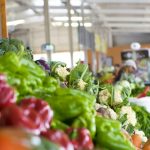Notable involvement of intermediaries in the high cost of living

Santo Domingo — “December, I liked it so you could leave,” a Mexican charro of yesteryear sang emphatically and emotionally with a wide-brimmed hat and a toy pistol on his belt. A slogan that, transplanted to today’s Dominican Republic, would have no effect if inflation was expected to be the one to leave the country clean in the last month of the year.
In 2024, the price pressures on essential consumer goods and services continued to be onerous, without respite, as they passed through many greedy hands, from producers to the final consumer.
Although the increase in the price of foodstuffs from the countryside is highlighted in the foreground, other finished articles of industrial origin and imports started to cost more at the beginning of the last quarter, which moved the Ministry of Industry, Commerce and Mipymes and Proconsumidor to come out in defense of consumers and to “analyze the causes of the price increases, most of which are unjustified,” as if to put themselves entirely on the sidelines of the onslaught.
He directly blamed the fact that a series of foods suddenly cost more on the meat processors (which he did not identify) for refraining from passing on to the final buyers the effects of a temporary suspension of 18% of the Itebis to sausages, which, from salami to high-end hams, are massively present on the tables of different layers of society.
An official grace that does not benefit the budgets of many families.
In the detection of increases of the FDC, it appears the onion that from being marketed at 40 pesos per pound went to 80, the potato was acquired at 50 and 60 pesos after being between 30 and 35, and the one that arrived from the United States, Canada, and China costs even more expensive to retailers, after passing through more than a colossus of wholesale supplies. In its weekly monitoring, the entity denounced the prices of plantains harvested in Barahona and Azua as prohibitive, which were sold at between 25 and 35 pesos per unit.
They arrive in the capital after passing too many “technical” stops at intermediate distribution points.
By measuring the historical rise in the prices of products subject to an increase in demand for Christmas, the newspaper El Caribe concluded that the cost of traditional dinners “has grown significantly in recent years and 2024 is no exception”.
GOING UP WITHOUT GOING DOWN
Several factors, including transportation costs, storage, distribution, and the profit margins of each intermediary, determine that consumers have to pay higher prices than those that should reasonably appear in the outlets after crossing distribution channels that are permanently distorted. This conclusion is reached by taking into account a market analysis of the specialized publication “Eldinero,” which explains what is happening concerning the most demanded cereal in the country:
“The 110-kilogram bushel of paddy rice, which sells on average at RD$2,891.62, translates into the price of paddy rice sold on the farms to millers being approximately RD$11.92 a pound. As it passes through the mills, where the grain is stored and processed, the average price increases to RD$3,103.4 per 125-pound sack. This means that at the next level of distribution with a lot of intermediation, the pound is sold at an average of RD$24.82, increasing its value by RD$12.9. This means that a pound of the cereal eventually costs RD$31.25 to the recipient. “Prices in supermarkets and colmados show an additional increase.”
In her permanent crusade in defense of the purchasing power of families, journalist and former director of Proconsumidor Altagracia Paulino has maintained that governments “should form a dialogue table with importers, supermarkets, suppliers and retailers to make prices transparent since there is speculation and, in addition, there is an exploitation of the inflation situation as a pretext by the local market. It is not that I put a price on beans or rice, but that there is a price ceiling, so that there can be no more than that”.
FLEEING TO BALES
But “man does not live by bread alone” (women and children too): Clothing is a primary need that is challenging to satisfy for a majority due to the prevailing precariousness of salaries because of the generalized short reach of current minimum wages. It has gained legitimacy to fill gaps in middle and lower-class closets with second-hand or “half-new” pieces brought into the country in barrels through marginal imports but of intense growth without going through ordinary intermediation.
A flow of shipments from abroad that feeds pervasive and informal commercialization to a certain extent concerns the press about the strong impact they have on conventional companies in several branches of commerce (and not only on fabrics), even mentioning that some recognized companies have had to reduce their operations.
One publication that touched on the subject some time ago predicted that “if the illegal practice of selling used goods continues, large sectors of the industry will be affected because it is no longer the classic rags that people used to buy, but the imports of these goods include everything, including modern electronic equipment.”
COURIERS IN FORCE
Increasingly on the defensive, the country’s consumers are jumping over oceans with the help of companies specializing in delivering packages, documents, and goods quickly, an option that trumps the intermediary role of formal commerce.
A decade ago, when only a few express import businesses were open to the public in Santo Domingo, in only 15 days, Customs reported Internet purchases that exceeded 250 million pesos, some 5.7 million dollars. This did not generate profit margins for companies with patents and a greater presence in urban areas.
There are currently some 747 representations of firms that transport an enormous amount of consumer goods to the Dominican Republic and not only clothing, which, even when subject to tax ceilings, are an effective means, again and again in the same month, to separate orders and evade tariffs on amounts of less than US$200.00. More than 400 couriers populate the National District, according to a not-very recent measurement, and their opening in the provinces has not stopped.
THEY MAKE HEALTH CARE MORE EXPENSIVE
The exercise of intermediate functions between suppliers and final recipients of goods and services is also being questioned in the healthcare sector, which is in charge of medical professionals and health establishments, including hospitals and private clinics. The so-called “Coalición Seguridad Social Digna” (Dignified Social Security Coalition) is at the forefront of raising questions about Health Risk Administrators (ARS) located in the middle of the road that patients must go through trying to get well.
The independent grouping of civil society that assumes the defense of the insured implies that the ARSs are placed in an unnecessary administrative role. They capture huge profits at the expense of the sick and against universal access to medical care. Similar accusations have been raised against the ARSs from other levels of the set of entities that are part of the Social Security objectives.
Francisco Tavarez, UASD economist and member of the coalition mentioned above, has argued that, in practice, the ARSs reflect “a mercantile and inhuman nature” of the current system. He sees them focused on “denying and putting up barriers” to access to health care, seriously affecting citizens. Among his main complaints was the requirement to renew prescriptions every three months, “even for diagnosed illnesses that require medications for continuous use.”
Warning about the consequences of the ARSs’ gravitation over health services, Tavarez considered that there is a risk of social radicalization in the country “if equitable access to health is not guaranteed.” He gave a dramatic example of what happened recently in the United States, where an angry insurance user assassinated the executive director of the largest insurance company in that country. Ominous prelude in sight, my lords.

















Well, here we are again , complaining about inflation like its some new phenomenon, but lets not forget who just won the election. its almost poetic really. We voted for the same leadership thats been hiking up prices like they’re training for an economic marathon. Four more years of “el cambio sigue, except the only thing really changing is how much less you can buy with the same pay. And can we talk about the meat processors? the gov blames them for not passing down tax benefits but they’re not exactly named and shamed. The funniest part is people are skipping the middleman altogether by shopping from oversea couriers like they’re dodging the draft. and Honestly I dont blame them if the choices between getting fleece at a local supermarket or shipping clothes and barrels from abroad, I’m rolling with the barrels, but what really gets me is the healthcare bit. you’re telling me we’re paying intermediaries just to access Medicare? ARS seems less like healthcare providers and more like bosses. you have to fight just to get what you already paid for. at the end of the day we made this bed we voted and now we’re lying in it. expensive onions, overpriced, rice, and all but hey four more years of the same right maybe by then we’ll be paying for plantains in monthly installments.
My friend this is a worldwide problem…inflation hit every corner of the world because of the covid lock downs…but I agree with being pissed off…